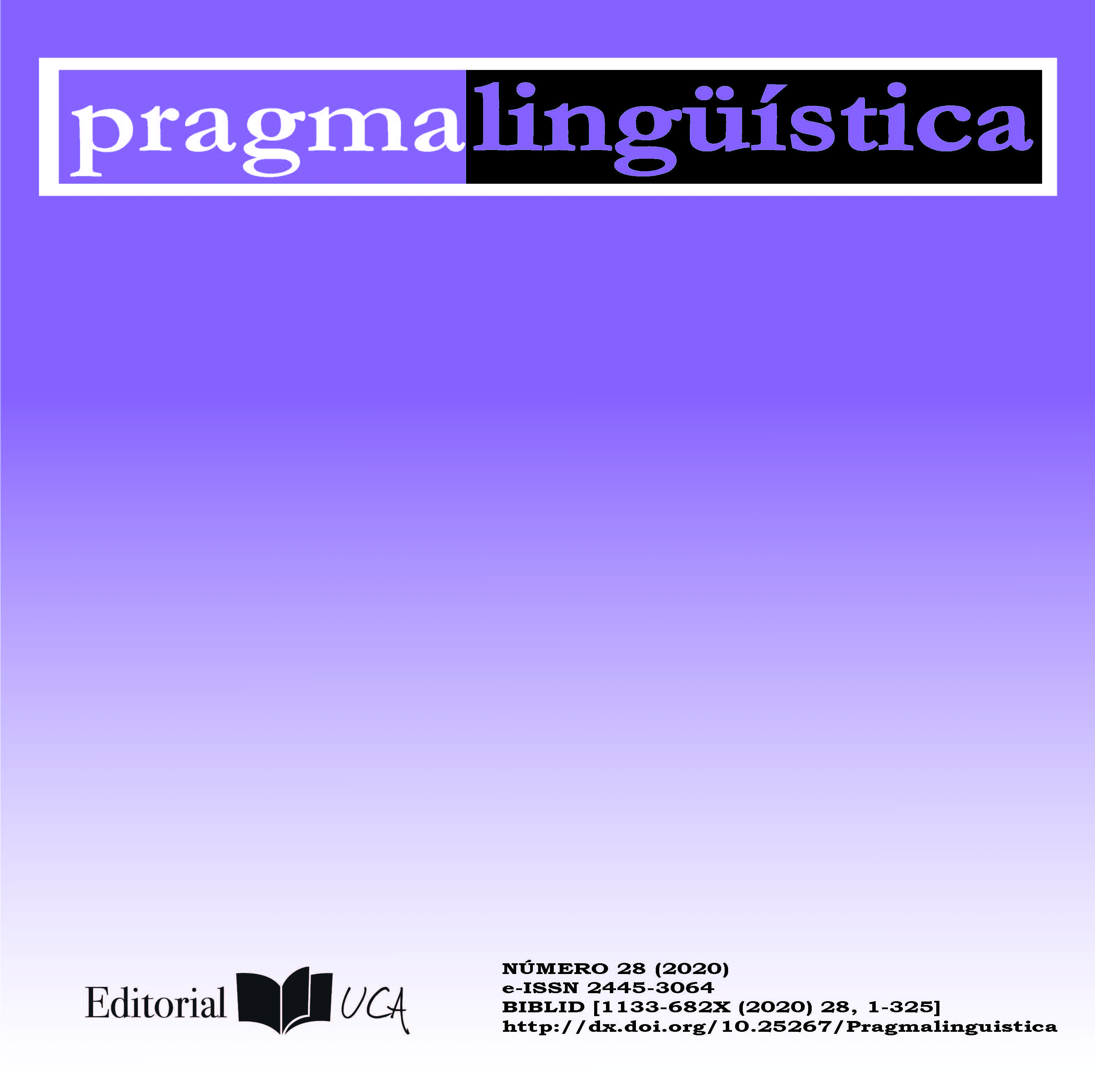Understanding language through corpora: METOOL, challenges for the analysis of discursive markers

DOI
https://doi.org/10.25267/Pragmalinguistica.2020.i28.13Info
Abstract
The identification and labelling of the discursive markers used in scientific papers represent a challenge, given their nature. That is why we have created a tool that identifies discursive markers and guides researchers in the use of metadiscourse. To carry out this project we have selected three different disciplines, engineering, medicine and linguistics. The purpose of the project is twofold: first, to characterise the rhetorical strategies that identify academic discourse and, then, to identify the rhetorical patterns among disciplines. For this, 'METOOL' was designed in collaboration with the University of Wolverhampton. Through corpus analysis and the identification of statistical frequencies, this tool analyses the ability to involve readers and convince them with, for example, persuasion or mitigation strategies.
Keywords
Downloads
How to Cite
License
Copyright (c) 2020 Marisa Carrió Pastor

This work is licensed under a Creative Commons Attribution-NonCommercial-NoDerivatives 4.0 International License.
References
ALBELDA, M. & BRIZ, A. (2010): “Cortesía y atenuantes verbales en las dos orillas a través de muestras orales”, Aleza, M. y Enguita, J. (coords.): La lengua española en América: normas y usos actuales, Valencia: Universitat de València, pp. 237-260.
ALBELDA, M. & CESTERO, A. (2011): “De nuevo sobre los procedimientos de atenuación”, Español Actual, 96, pp. 121-155.
ALBELDA, M. (2008): “Atenuantes en Chile y España: distancia o acercamiento”, Actas del Tercer Coloquio del Pro-grama EDICE. Estocolmo: Univer-sidad de Estocolmo, pp. 89-113.
ALONSO-ALMEIDA, F. (2015): “On the mitigating function of modality and evidentiality. Evidence from English and Spanish medical research pa-pers”, Intercultural Pragmatics, 12(1), pp. 33–57.
ALONSO-ALMEIDA, F. & CARRIÓ-PASTOR, M. L. (2019): “Constructing legitimation in Scottish newspapers: The case of the independence refer-endum”, Discourse Studies, 21(6), pp. 621–635.
ALONSO-ALMEIDA, F. & CARRIÓ-PASTOR, M. L. (2017): “Variation and Function of Modals in Linguis-tics and Engineering Research Pa-pers in English”, Marín-Arrese, J. I., Lavid-López, J., Carretero, M., Martín de la Romero, E. D., Rosa, M. V. y Pérez Blanco, M. (coords.), Evidential-ity and Modality in European Lan-guages. Discourse- pragmatic perspectives, pp. 277–311. Berna: Peter Lang.
ALONSO-ALMEIDA, F. & CARRIÓ-PASTOR, M. L. (2015): “Sobre la ca-tegorización de seem en inglés y su traducción en español. Análisis de un corpus paralelo”, Revista Signos, 48, pp. 154-173.
BEKE, R. (2005): “El metadiscurso interpersonal en artículos de investigación”, Revista Signos, 38(57), pp. 7-18.
BRIZ, A. (2001): El español coloquial en la conversación: esbozo de pragma-gramática, Barcelona: Ariel.
BRIZ, A. (2007): “Para un análisis semántico, pragmático y sociopragmático de la cortesía atenuadora en España y América”, Lingüística Española Actual, 29(1), pp. 5-40.
CARRIÓ PASTOR, M. L. (2014): “Cross-cultural variation in the use of modal verbs in academic English”, Sky, Journal of Linguistics, 27, pp. 153-166.
CARRIÓ PASTOR, M. L. (2015): “Identification of Rhetorical Moves in Business E-mails Written by Indian Speakers of English”, Darics, E. (coord.), Digital Business Discourse, Londres: Palgrave MacMillan, pp. 226-242.
CARRIÓ-PASTOR, M. L. (2016a): “A contrastive study of interactive meta-discourse in academic papers written in English and in Spanish”, Alonso Almeida, F., Cruz García, L. y González Ruiz, V. (coords.), Corpus-based studies on language varieties, Berna: Peter Lang, pp. 80-102.
CARRIÓ-PASTOR, M. L. (2016b): “A contras-tive study of the hedges used by English, Spanish and Chinese research-ers in academic papers”, Alonso Al-meida, F. et al. (coords.), Input a word, analyze the world: Selected approaches to Corpus Linguistics, Newcastle upon Tyne: Cambridge Scholars, pp. 477-492.
CARRIÓ-PASTOR, M. L. (2016c): “Mitigation of claims in medical research papers: A comparative study of English and Spanish writers”, Communication & Medicine, 13, pp. 1-25.
CARRIÓ-PASTOR, M. L. (2017): “Verbal phraseology: An Analysis of Cogni-tive verbs in Linguistics, Engineering and Medicine Academic Papers” y Mitkov, R. (coord.), Computational and Corpus-based Phraseology. Lecture Notes in Artificial Intelligence, Berlin: Springer, pp. 325–336.
CARRIÓ PASTOR, M. L. (2019): “Authorial engagement in business emails: a cross-cultural analysis of attitude and engagement markers”, Sancho Guinda y C. (coord.), Engagement in Professional Genres, Amsterdam: John Benjamins, pp. 47-65.
CARRIÓ-PASTOR, M. L. & MUÑIZ CALDERÓN, R. (2015a): “A contrastive analysis of metadiscourse features in business e-mails written by non-native speakers of English”, Procedia, Social and Behavioral Sciences, 173, pp. 214-221.
CARRIÓ PASTOR, M. L. & MUÑIZ CALDE-RÓN, R. (2015b): “Identification and causes of lexical variation in Chinese Business English”, English Today, 31(1), pp. 10-15.
FLORES, N. (2020): Linguistic mitigation in English and Spanish: How speakers attenuate expressions, Londres: Routledge.
HALLIDAY, M. A. K. (1998): El lenguaje como semiótica social. La interpreta-ción social del lenguaje y su significado, México: S. L. Fondo de cultura económica de España.
HYLAND, K. (2005): Metadiscourse: Exploring Interaction in Writing, Londres: Continuum.
MOYA, P. & CARRIÓ-PASTOR, M. L. (2018a): “Análisis comparativo de los marcadores de compromiso en los comentarios sobre noticias digitales en España y Chile”, Onomázein. Revista de lingüística, filología y traducción, número especial: 4, pp. 26-48.
MOYA, P. & CARRIÓ-PASTOR, M. L. (2018b): “Estrategias de intensifica-ción en los comentarios digitales sobre noticias” Spanish in Context, 15(3), pp. 369-391.
MOYA, P. & CARRIÓ-PASTOR, M. L. (2018c): “La atenuación en los comentarios sobre las noticias digitales en periódicos de España y Chile”, Onomázein, Revista de lingüística, filología y traducción, 40, pp. 56-76.
MUR DUEÑAS, P. (2011): “An intercultural analysis of metadiscourse features in research articles written in English and in Spanish”, Journal of Pragmatics, 43, pp. 3068-3079.
SALAS VALDEBENITO, M. (2015): “Una propuesta de taxonomía de marcado-res metadiscursivos para el discurso académico-científico escrito en español”, Revista Signos, 48(87), pp. 95-120.
SINCLAIR, J. (1987): Looking up: An account of the COBUILD project in lexical computing and the development of the Collins COBUILD English language dictionary, Oxford: Collins.
THOMPSON, G. (2001): “Interaction in Academic Writing: Learning to Argue with the Reader”, Applied Linguistics, 22(1), pp. 58-78.






